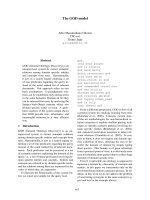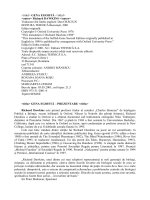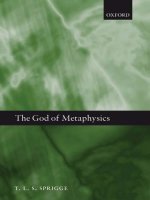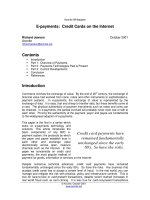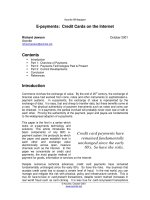The god delusion richard dawkins
Bạn đang xem bản rút gọn của tài liệu. Xem và tải ngay bản đầy đủ của tài liệu tại đây (1.65 MB, 322 trang )
Extraordinary International Acclaim for Richard Dawkins and The
God Delusion
“If I had to identify Dawkins’ cardinal virtues, I would say that he is brilliant, articulate,
impassioned, and impolite…The God Delusion is a fine and significant book…. irreverent and
penetrating.”
—San Francisco Chronicle
“Dawkins is frequently dismissed as a bully, but he is only putting theological doctrines to the same
kind of scrutiny that any scientific theory must withstand.”
—Scientific American
“The God Delusion deserves multiple readings, not just as an important work of science, but as a
great work of literature.”
—Steven Weinberg, Times Literary Supplement (UK)
“The most coherent and devastating indictment of religion I have ever read.”
—Mail on Sunday (UK)
“This thoroughly engaging thesis on atheism cajoles, bullies, persuades and dazzles…Some of it is
hard to disagree with, some of it will make you hopping mad. Perfect, really.”
—Sunday Times (Australia)
“Fascinating…expressed in sparkling language which makes the book not only a pleasure to read but
also a stimulus to thinking across this widest of spectrums.”
—Financial Times
“Engrossing…this is an elegant, engaging and persuasive writer…The God Delusion is a good,
strong argumentative challenge to any thoughtful believer with the courage to read it with care and try
to dispute it.”
—The Globe and Mail (Canada)
“A lively writer…an entertaining read…Dawkins’s outrage at the persistence of medieval ideas in
the modern era is warranted. In fact, it’s overdue.”
—The Nation
“Dawkins is Britain’s most famous atheist and in The God Delusion he gives eloquent vent to his
uncompromising views…if you want an understanding of evolution or an argument for atheism, there
are few better guides than Richard Dawkins.”
—Sunday Telegraph (UK)
“A surprisingly elegant and gracious conclusion, depicting science as exactly the kind of glorious
expansion of our perceptions that we once thought only God could provide.”
—New York magazine
“[A] well-stocked arsenal of anti-religious thought.”
—U.S. News and World Report
“Passionate, clever, funny, uplifting and above all, desperately needed.”
—Daily Express (UK)
“Lots of good, hard-hitting stuff about the imbecilities of religious fanatics and frauds of all stripes.”
—New York Times Book Review
“You needn’t buy the total Dawkins package to glory in his having the guts to lay out the evils
religions can do.”
—Kirkus Reviews, starred review
“A rallying cry to those who want to come out as non-believers, but are not quite sure if they dare.”
—Daily Mail (UK)
“A gloriously belligerent attack on the foaming tide of superstition that is washing over the world
once again, from a great scientist who has demonstrated throughout his career the power of cool, hard
reason to explain life itself.”
—The Independent (UK)
“Oh, it’s so refreshing, after being told all your life that it is virtuous to be full of faith, spirit, and
superstition, to read such a resounding trumpet blast for truth instead. It feels like coming up for air.”
—Matt Ridley, author of Genome
“A spirited and exhilarating read…Dawkins comes roaring forth in the full vigor of his powerful
arguments.”
—Guardian (UK)
“A wonderful book…joyous, elegant, fair, engaging, and often very funny…informed throughout by an
exhilarating breadth of reference and clarity of thought.”
—Michael Frayn, author of The Human Touch
“The God Delusion is written with all the clarity and elegance of which Dawkins is a master. It is so
well written, in fact, that children deserve to read it as well as adults.”
—Philip Pullman, author of His Dark Materials trilogy
“A brave and important book.”
—Desmond Morris, author of The Naked Ape
“Richard Dawkins is the leading soothsayer of our time. Through his exploration of gene-based
evolution of life his work has had a profound effect on so much of our collective thinking and The
God Delusion continues his thought-provoking tradition.”
—J. Craig Venter, decoder of the human genome
“Passionate religious irrationality too often poses serious obstacles to human betterment. To oppose
it effectively, the world needs equally passionate rationalists unafraid to challenge long accepted
beliefs. Richard Dawkins so stands out through the cutting intelligence of The God Delusion.”
—James D. Watson, co-discoverer of DNA, author of The Double Helix
“Should be read by everyone from atheist to monk. If its merciless rationalism doesn’t enrage you at
some point, you probably aren’t alive.”
—Julian Barnes, author of Arthur and George
“A magnificent book, lucid and wise, truly magisterial.”
—Ian McEwan, author of Atonement
Books by Richard Dawkins
THE SELFISH GENE
THE EXTENDED PHENOTYPE
THE BLIND WATCHMAKER
RIVER OUT OF EDEN
CLIMBING MOUNT IMPROBABLE
UNWEAVING THE RAINBOW
A DEVIL’S CHAPLAIN
THE ANCESTOR’S TALE
THE GOD DELUSION
Richard Dawkins
THE GOD DELUSION
A MARINER BOOK
HOUGHTON MIFFLIN COMPANY
Boston • New York
Copyright © 2006 by Richard Dawkins
Preface © 2008 by Richard Dawkins
ALL RIGHTS RESERVED
First published in Great Britain by Bantam Press, a division of Transworld Publishers, 2006
For information about permission to reproduce selections from this book, write to Permissions,
Houghton Mifflin Company, 215 Park Avenue South, New York, New York 10003.
www.houghtonmifflinbooks.com
Library of Congress Cataloging-in-Publication Data
Dawkins, Richard, date.
The God delusion / Richard Dawkins.
p. cm.
Includes bibliographical references.
ISBN: 978-1-931498-23-4
1. Irreligion. 2. Atheism. 3. God. 4. Religion. I. Title.
bl2775.3.d39 2006
211'.8—dc22 2006015506
IN MEMORIAM
Douglas Adams
(1952–2001)
‘Isn’t it enough to see that a garden is beautiful
without having to believe that there are
fairies at the bottom of it too?’
Contents
Preface to the paperback edition
Preface
1 A DEEPLY RELIGIOUS NON-BELIEVER
Deserved respect
Undeserved respect
2 THE GOD HYPOTHESIS
Polytheism
Monotheism
Secularism, the Founding Fathers and the religion of America
The poverty of agnosticism
NOMA
The Great Prayer Experiment
The Neville Chamberlain school of evolutionists
Little green men
3 ARGUMENTS FOR GOD’S EXISTENCE
Thomas Aquinas’ ‘proofs’
The ontological argument and other a priori arguments
The argument from beauty
The argument from personal ‘experience’
The argument from scripture
The argument from admired religious scientists
Pascal’s Wager
Bayesian arguments
4 WHY THERE ALMOST CERTAINLY IS NO GOD
The Ultimate Boeing
Natural selection as a consciousness-raiser
Irreducible complexity
The worship of gaps
The anthropic principle: planetary version
The anthropic principle: cosmological version
An interlude at Cambridge
5 THE ROOTS OF RELIGION
The Darwinian imperative
Direct advantages of religion
Group selection
Religion as a by-product of something else
Psychologically primed for religion
Tread softly, because you tread on my memes
Cargo cults
6 THE ROOTS OF MORALITY: WHY ARE WE GOOD?
Does our moral sense have a Darwinian origin?
A case study in the roots of morality
If there is no God, why be good?
7 THE ‘GOOD’ BOOK AND THE CHANGING MORAL ZEITGEIST
The Old Testament
Is the New Testament any better?
Love thy neighbour
The moral Zeitgeist
What about Hitler and Stalin? Weren’t they atheists?
8 WHAT’S WRONG WITH RELIGION? WHY BE SO HOSTILE?
Fundamentalism and the subversion of science
The dark side of absolutism
Faith and homosexuality
Faith and the sanctity of human life
The Great Beethoven Fallacy
How ‘moderation’ in faith fosters fanaticism
9 CHILDHOOD, ABUSE AND THE ESCAPE FROM RELIGION
Physical and mental abuse
In defence of children
An educational scandal
Consciousness-raising again
Religious education as a part of literary culture
10 A MUCH NEEDED GAP?
Binker
Consolation
Inspiration
The mother of all burkas
Appendix: a partial list of friendly addresses, for individuals needing support in escaping from
religion
Books cited or recommended
Notes
Preface to the paperback edition
The God Delusion in the hardback edition was widely described as the surprise bestseller of 2006. It
was warmly received by the great majority of those who sent in their personal reviews to Amazon
(more than 1,000 at the time of writing). Approval was less overwhelming in the printed reviews,
however. A cynic might put this down to an unimaginative reflex of reviews editors: It has ‘God’ in
the title, so send it to a known faith-head. That would be too cynical, however. Several unfavourable
reviews began with the phrase, which I long ago learned to treat as ominous, ‘I’m an atheist BUT…’
As Daniel Dennett noted in Breaking the Spell, a bafflingly large number of intellectuals ‘believe in
belief’ even though they lack religious belief themselves. These vicarious second-order believers are
often more zealous than the real thing, their zeal pumped up by ingratiating broad-mindedness: ‘Alas,
I can’t share your faith but I respect and sympathize with it.’
‘I’m an atheist, BUT…’ The sequel is nearly always unhelpful, nihilistic or – worse – suffused
with a sort of exultant negativity. Notice, by the way, the distinction from another favourite genre: ‘I
used to be an atheist, but…’ That is one of the oldest tricks in the book, much favoured by religious
apologists from C. S. Lewis to the present day. It serves to establish some sort of street cred up front,
and it is amazing how often it works. Look out for it.
I wrote an article for the website RichardDawkins.net called ‘I’m an atheist BUT…’ and I have
borrowed from it in the following list of critical or otherwise negative points from reviews of the
hardback. That website, conducted by the inspired Josh Timonen, has attracted an enormous number
of contributors who have effectively eviscerated all these criticisms, but in less guarded, more
outspoken tones than my own, or than those of my academic colleagues A. C. Grayling, Daniel
Dennett, Paul Kurtz, Steven Weinberg and others who have done so in print (and whose comments are
reproduced on the same website).
You can’t criticize religion without a detailed analysis of learned books of theology.
Surprise bestseller? If I’d gone to town, as one self-consciously intellectual critic wished, on the
epistemological differences between Aquinas and Duns Scotus; if I’d done justice to Eriugena on
subjectivity, Rahner on grace or Moltmann on hope (as he vainly hoped I would), my book would
have been more than a surprise bestseller: it would have been a miraculous one. But that is not the
point. Unlike Stephen Hawking (who accepted advice that every formula he published would halve
his sales), I would happily have forgone bestseller-dom if there had been the slightest hope of Duns
Scotus illuminating my central question of whether God exists. The vast majority of theological
writings simply assume that he does, and go on from there. For my purposes, I need consider only
those theologians who take seriously the possibility that God does not exist and argue that he does.
This I think Chapter 3 achieves, with what I hope is good humour and sufficient comprehensiveness.
When it comes to good humour, I cannot improve on the splendid ‘Courtier’s Reply’, published
by P. Z. Myers on his ‘Pharyngula’ website.
I have considered the impudent accusations of Mr Dawkins with exasperation at his lack of
serious scholarship. He has apparently not read the detailed discourses of Count Roderigo
of Seville on the exquisite and exotic leathers of the Emperor’s boots, nor does he give a
moment’s consideration to Bellini’s masterwork, On the Luminescence of the Emperor’s
Feathered Hat. We have entire schools dedicated to writing learned treatises on the beauty
of the Emperor’s raiment, and every major newspaper runs a section dedicated to imperial
fashion…Dawkins arrogantly ignores all these deep philosophical ponderings to crudely
accuse the Emperor of nudity…Until Dawkins has trained in the shops of Paris and Milan,
until he has learned to tell the difference between a ruffled flounce and a puffy pantaloon,
we should all pretend he has not spoken out against the Emperor’s taste. His training in
biology may give him the ability to recognize dangling genitalia when he sees it, but it has
not taught him the proper appreciation of Imaginary Fabrics.
To expand the point, most of us happily disavow fairies, astrology and the Flying Spaghetti Monster,
without first immersing ourselves in books of Pastafarian theology etc.
The next criticism is a related one: the great ‘straw man’ offensive.
You always attack the worst of religion and ignore the best.
‘You go after crude, rabble-rousing chancers like Ted Haggard, Jerry Falwell and Pat Robertson,
rather than sophisticated theologians like Tillich or Bonhoeffer who teach the sort of religion I
believe in.’
If only such subtle, nuanced religion predominated, the world would surely be a better place,
and I would have written a different book. The melancholy truth is that this kind of understated,
decent, revisionist religion is numerically negligible. To the vast majority of believers around the
world, religion all too closely resembles what you hear from the likes of Robertson, Falwell or
Haggard, Osama bin Laden or the Ayatollah Khomeini. These are not straw men, they are all too
influential, and everybody in the modern world has to deal with them.
I’m an atheist, but I wish to dissociate myself from your shrill, strident, intemperate, intolerant,
ranting language.
Actually, if you look at the language of The God Delusion, it is rather less shrill or intemperate than
we regularly take in our stride – when listening to political commentators for example, or theatre, art
or book critics. Here are some samples of recent restaurant criticism from leading London
newspapers:
‘It is difficult, if not impossible, to imagine anyone conjuring up a restaurant, even in their
sleep, where the food in its mediocrity comes so close to inedible.’
‘All things considered, quite the worst restaurant in London, maybe the world…serves
horrendous food, grudgingly, in a room that is a museum to Italian waiters’ taste circa
1976.’
‘The worst meal I’ve ever eaten. Not by a small margin. I mean the worst! The most
unrelievedly awful!’
‘[What] looked like a sea mine in miniature was the most disgusting thing I’ve put in my
mouth since I ate earthworms at school.’
The strongest language to be found in The God Delusion is tame and measured by comparison. If
it sounds intemperate, it is only because of the weird convention, almost universally accepted (see the
quotation from Douglas Adams), that religious faith is uniquely privileged: above and beyond
criticism. Insulting a restaurant might seem trivial compared to insulting God. But restaurateurs and
chefs really exist and they have feelings to be hurt, whereas blasphemy, as the witty bumper sticker
puts it, is a victimless crime.
In 1915, the British Member of Parliament Horatio Bottomley recommended that, after the war,
‘If by chance you should discover one day in a restaurant you are being served by a German waiter,
you will throw the soup in his foul face; if you find yourself sitting at the side of a German clerk, you
will spill the inkpot over his foul head.’ Now that’s strident and intolerant (and, I should have
thought, ridiculous and ineffective as rhetoric even in its own time). Contrast it with the opening
sentence of Chapter 2, which is the passage most often quoted as ‘strident’ or ‘shrill’. It is not for me
to say whether I succeeded, but my intention was closer to robust but humorous broadside than shrill
polemic. In public readings of The God Delusion this is the one passage that is guaranteed to get a
good-natured laugh, which is why my wife and I invariably use it as the warm-up act to break the ice
with a new audience. If I could venture to suggest why the humour works, I think it is the incongruous
mismatch between a subject that could have been stridently or vulgarly expressed, and the actual
expression in a drawn-out list of Latinate or pseudo-scholarly words (‘filicidal’, ‘megalomaniacal’,
‘pestilential’). My model here was one of the funniest writers of the twentieth century, and nobody
could call Evelyn Waugh shrill or strident (I even gave the game away by mentioning his name in the
anecdote that immediately follows).
Book critics or theatre critics can be derisively negative and gain delighted praise for the
trenchant wit of their review. But in criticisms of religion even clarity ceases to be a virtue and
sounds like aggressive hostility. A politician may attack an opponent scathingly across the floor of the
House and earn plaudits for his robust pugnacity. But let a soberly reasoning critic of religion employ
what would in other contexts sound merely direct or forthright, and it will be described as a ‘rant’.
Polite society will purse its lips and shake its head: even secular polite society, and especially that
part of secular society that loves to announce, ‘I’m an atheist, BUT…’
You are only preaching to the choir. What’s the point?
‘Converts’ Corner’ on RichardDawkins.net gives the lie to this premise, but even taking it at face
value there are good answers. One is that the non-believing choir is a lot bigger than many people
think, especially in America. But, again especially in America, it is largely a closet choir, and it
desperately needs encouragement to come out. Judging by the thanks I received all over North
America on my book tour, the encouragement that people like Sam Harris, Dan Dennett, Christopher
Hitchens and me are able to give is greatly appreciated.
A more subtle reason for preaching to the choir is the need to raise consciousness. When the
feminists raised our consciousness about sexist pronouns, they would have been preaching to the
choir where the more substantive issues of the rights of women and the evils of discrimination against
them were concerned. But that decent, liberal choir still needed its consciousness raised with respect
to everyday language. However right-on we may have been on the political issues of rights and
discrimination, we nevertheless still unconsciously bought into linguistic conventions that made half
the human race feel excluded.
There are other linguistic conventions that need to go the same way as sexist pronouns, and the
atheist choir is not exempt. We all need our consciousness raised. Atheists as well as theists
unconsciously observe society’s convention that we must be especially polite and respectful to faith.
And I never tire of drawing attention to society’s tacit acceptance of the labelling of small children
with the religious opinions of their parents. Atheists need to raise their own consciousness of the
anomaly: religious opinion is the one kind of parental opinion that – by almost universal consent –
can be fastened upon children who are, in truth, too young to know what their opinion really is. There
is no such thing as a Christian child: only a child of Christian parents. Seize every opportunity to ram
it home.
You are just as much of a fundamentalist as those you criticize.
No, please, it is all too easy to mistake passion that can change its mind for fundamentalism, which
never will. Fundamentalist Christians are passionately opposed to evolution and I am passionately in
favour of it. Passion for passion, we are evenly matched. And that, according to some, means we are
equally fundamentalist. But, to borrow an aphorism whose source I am unable to pin down, when two
opposite points of view are expressed with equal force, the truth does not necessarily lie midway
between them. It is possible for one side to be simply wrong. And that justifies passion on the other
side.
Fundamentalists know what they believe and they know that nothing will change their minds. The
quotation from Kurt Wise on Chapter 8 says it all: ‘…if all the evidence in the universe turns against
creationism, I would be the first to admit it, but I would still be a creationist because that is what the
Word of God seems to indicate. Here I must stand.’ It is impossible to overstress the difference
between such a passionate commitment to biblical fundamentals and the true scientist’s equally
passionate commitment to evidence. The fundamentalist Kurt Wise proclaims that all the evidence in
the universe would not change his mind. The true scientist, however passionately he may ‘believe’ in
evolution, knows exactly what it would take to change his mind: Evidence. As J. B. S. Haldane said
when asked what evidence might contradict evolution, ‘Fossil rabbits in the Precambrian.’ Let me
coin my own opposite version of Kurt Wise’s manifesto: ‘If all the evidence in the universe turned in
favour of creationism, I would be the first to admit it, and I would immediately change my mind. As
things stand, however, all available evidence (and there is a vast amount of it) favours evolution. It is
for this reason and this reason alone that I argue for evolution with a passion that matches the passion
of those who argue against it. My passion is based on evidence. Theirs, flying in the face of evidence
as it does, is truly fundamentalist.’
I’m an atheist myself, but religion is here to stay. Live with it.
‘You want to get rid of religion? Good luck to you! You think you can get rid of religion? What planet
are you living on? Religion is a fixture. Get over it!’
I could bear any of these downers, if they were uttered in something approaching a tone of regret
or concern. On the contrary. The tone of voice is sometimes downright gleeful. I don’t think it’s
masochism. More probably, we can put it down to ‘belief in belief’ again. These people may not be
religious themselves, but they love the idea that other people are religious. This brings me to my final
category of naysayers.
I’m an atheist myself, but people need religion.
‘What are you going to put in its place? How are you going to comfort the bereaved? How are you
going to fill the need?’
What patronizing condescension! ‘You and I, of course, are much too intelligent and well
educated to need religion. But ordinary people, hoi polloi, the Orwellian proles, the Huxleian Deltas
and Epsilon semi-morons, need religion.’ I am reminded of an occasion when I was lecturing at a
conference on the public understanding of science, and I briefly inveighed against ‘dumbing down’. In
the question and answer session at the end, one member of the audience stood up and suggested that
dumbing down might be necessary ‘to bring minorities and women to science’. His tone of voice told
that he genuinely thought he was being liberal and progressive. I can just imagine what the women and
‘minorities’ in the audience thought about it.
Returning to humanity’s need for comfort, it is, of course, real, but isn’t there something childish
in the belief that the universe owes us comfort, as of right? Isaac Asimov’s remark about the
infantilism of pseudoscience is just as applicable to religion: ‘Inspect every piece of pseudoscience
and you will find a security blanket, a thumb to suck, a skirt to hold.’ It is astonishing, moreover, how
many people are unable to understand that ‘X is comforting’ does not imply ‘X is true’.
A related plaint concerns the need for a ‘purpose’ in life. To quote one Canadian critic:
The atheists may be right about God. Who knows? But God or no God, it’s clear that
something in the human soul requires a belief that life has a purpose that transcends the
material plane. One would think that a more-rational-than-thou empiricist such as Dawkins
would recognize this unchanging aspect of human nature…does Dawkins really think this
world would be a more humane place if we all looked to The God Delusion instead of The
Bible for truth and comfort?
Actually yes, since you mention ‘humane’, yes I do, but I must repeat, yet again, that the
consolation-content of a belief does not raise its truth-value. Of course I cannot deny the need for
emotional comfort, and I cannot claim that the world-view adopted in this book offers any more than
moderate comfort to, for example, the bereaved. But if the comfort that religion seems to offer is
founded on the neurologically highly implausible premise that we survive the death of our brains, do
you really want to defend it? In any case, I don’t think I have ever met anyone at a funeral who
dissents from the view that the non-religious parts (eulogies, the deceased’s favourite poems or
music) are more moving than the prayers.
Having read The God Delusion, Dr David Ashton, a British consultant physician, wrote to me
on the unexpected death, on Christmas Day 2006, of his beloved seventeen-year-old son, Luke.
Shortly before Luke’s death, the two of them had talked appreciatively of the charitable foundation
that I am setting up to encourage reason and science. At Luke’s funeral on the Isle of Man, his father
suggested to the congregation that, if they wished to make any kind of contribution in Luke’s memory,
they should send it to my foundation, as Luke would have wished. The thirty cheques received
amounted to more than £2,000, including more than £600 from a whip-round in the local village pub.
This boy was obviously much loved. When I read the Order of Service for the funeral ceremony, I
literally wept (although I had never met Luke), and I asked for permission to reproduce it at
RichardDawkins.net. A lone piper played the Manx lament ‘Ellen Vallin’. Two friends spoke
eulogies. Dr Ashton himself recited Dylan Thomas’s beautiful poem ‘Fern Hill’ (‘Now as I was
young and easy, under the apple boughs’ – so achingly evocative of lost youth). And then, I catch my
breath to report, he read the opening lines of my own Unweaving the Rainbow, lines that I have long
earmarked for my own funeral.
Obviously there are exceptions, but I suspect that for many people the main reason they cling to
religion is not that it is consoling, but that they have been let down by our educational system and
don’t realize that non-belief is even an option. This is certainly true of most people who think they are
creationists. They have simply not been properly taught Darwin’s astounding alternative. Probably the
same is true of the belittling myth that people ‘need’ religion. At a recent conference in 2006, an
anthropologist (and prize specimen of I’m-an-atheist-buttery) quoted Golda Meir when asked whether
she believed in God: ‘I believe in the Jewish people, and the Jewish people believe in God.’ Our
anthropologist substituted his own version: ‘I believe in people, and people believe in God.’ I prefer
to say that I believe in people, and people, when given the right encouragement to think for
themselves about all the information now available, very often turn out not to believe in God and to
lead fulfilled and satisfied – indeed, liberated – lives.
In this new paperback edition I have taken the opportunity to make a few minor improvements, and
correct some small errors that readers of the hardback have kindly drawn to my attention.
Preface
As a child, my wife hated her school and wished she could leave. Years later, when she was in her
twenties, she disclosed this unhappy fact to her parents, and her mother was aghast: ‘But darling, why
didn’t you come to us and tell us?’ Lalla’s reply is my text for today: ‘But I didn’t know I could.’
I didn’t know I could.
I suspect – well, I am sure – that there are lots of people out there who have been brought up in
some religion or other, are unhappy in it, don’t believe it, or are worried about the evils that are done
in its name; people who feel vague yearnings to leave their parents’ religion and wish they could, but
just don’t realize that leaving is an option. If you are one of them, this book is for you. It is intended to
raise consciousness – raise consciousness to the fact that to be an atheist is a realistic aspiration, and
a brave and splendid one. You can be an atheist who is happy, balanced, moral, and intellectually
fulfilled. That is the first of my consciousness-raising messages. I also want to raise consciousness in
three other ways, which I’ll come on to.
In January 2006 I presented a two-part television documentary on British television (Channel
Four) called Root of All Evil? From the start, I didn’t like the title and fought it hard. Religion is not
the root of all evil, for no one thing is the root of all anything. But I was delighted with the
advertisement that Channel Four put in the national newspapers. It was a picture of the Manhattan
skyline with the caption ‘Imagine a world without religion.’ What was the connection? The twin
towers of the World Trade Center were conspicuously present.
Imagine, with John Lennon, a world with no religion. Imagine no suicide bombers, no 9/11, no
7/7, no Crusades, no witch-hunts, no Gunpowder Plot, no Indian partition, no Israeli/Palestinian
wars, no Serb/Croat/Muslim massacres, no persecution of Jews as ‘Christ-killers’, no Northern
Ireland ‘troubles’, no ‘honour killings’, no shiny-suited bouffant-haired televangelists fleecing
gullible people of their money (‘God wants you to give till it hurts’). Imagine no Taliban to blow up
ancient statues, no public beheadings of blasphemers, no flogging of female skin for the crime of
showing an inch of it. Incidentally, my colleague Desmond Morris informs me that John Lennon’s
magnificent song is sometimes performed in America with the phrase ‘and no religion too’
expurgated. One version even has the effrontery to change it to ‘and one religion too’.
Perhaps you feel that agnosticism is a reasonable position, but that atheism is just as dogmatic as
religious belief? If so, I hope Chapter 2 will change your mind, by persuading you that ‘the God
Hypothesis’ is a scientific hypothesis about the universe, which should be analysed as sceptically as
any other. Perhaps you have been taught that philosophers and theologians have put forward good
reasons to believe in God. If you think that, you might enjoy Chapter 3 on ‘Arguments for God’s
existence’ – the arguments turn out to be spectacularly weak. Maybe you think it is obvious that God
must exist, for how else could the world have come into being? How else could there be life, in all its
rich diversity, with every species looking uncannily as though it had been ‘designed’? If your thoughts
run along those lines, I hope you will gain enlightenment from Chapter 4 on ‘Why there almost
certainly is no God’. Far from pointing to a designer, the illusion of design in the living world is
explained with far greater economy and with devastating elegance by Darwinian natural selection.
And, while natural selection itself is limited to explaining the living world, it raises our
consciousness to the likelihood of comparable explanatory ‘cranes’ that may aid our understanding of
the cosmos itself. The power of cranes such as natural selection is the second of my four
consciousness-raisers.
Perhaps you think there must be a god or gods because anthropologists and historians report that
believers dominate every human culture. If you find that convincing, please refer to Chapter 5, on
‘The roots of religion’, which explains why belief is so ubiquitous. Or do you think that religious
belief is necessary in order for us to have justifiable morals? Don’t we need God, in order to be
good? Please read Chapters 6 and 7 to see why this is not so. Do you still have a soft spot for religion
as a good thing for the world, even if you yourself have lost your faith? Chapter 8 will invite you to
think about ways in which religion is not such a good thing for the world.
If you feel trapped in the religion of your upbringing, it would be worth asking yourself how this
came about. The answer is usually some form of childhood indoctrination. If you are religious at all it
is overwhelmingly probable that your religion is that of your parents. If you were born in Arkansas
and you think Christianity is true and Islam false, knowing full well that you would think the opposite
if you had been born in Afghanistan, you are the victim of childhood indoctrination. Mutatis mutandis
if you were born in Afghanistan.
The whole matter of religion and childhood is the subject of Chapter 9, which also includes my
third consciousness-raiser. Just as feminists wince when they hear ‘he’ rather than ‘he or she’, or
‘man’ rather than ‘human’, I want everybody to flinch whenever we hear a phrase such as ‘Catholic
child’ or ‘Muslim child’. Speak of a ‘child of Catholic parents’ if you like; but if you hear anybody
speak of a ‘Catholic child’, stop them and politely point out that children are too young to know
where they stand on such issues, just as they are too young to know where they stand on economics or
politics. Precisely because my purpose is consciousness-raising, I shall not apologize for mentioning
it here in the Preface as well as in Chapter 9. You can’t say it too often. I’ll say it again. That is not a
Muslim child, but a child of Muslim parents. That child is too young to know whether it is a Muslim
or not. There is no such thing as a Muslim child. There is no such thing as a Christian child.
Chapters 1 and 10 top and tail the book by explaining, in their different ways, how a proper
understanding of the magnificence of the real world, while never becoming a religion, can fill the
inspirational role that religion has historically – and inadequately – usurped.
My fourth consciousness-raiser is atheist pride. Being an atheist is nothing to be apologetic
about. On the contrary, it is something to be proud of, standing tall to face the far horizon, for atheism
nearly always indicates a healthy independence of mind and, indeed, a healthy mind. There are many
people who know, in their heart of hearts, that they are atheists, but dare not admit it to their families
or even, in some cases, to themselves. Partly, this is because the very word ‘atheist’ has been
assiduously built up as a terrible and frightening label. Chapter 9 quotes the comedian Julia
Sweeney’s tragi-comic story of her parents’ discovery, through reading a newspaper, that she had
become an atheist. Not believing in God they could just about take, but an atheist! An ATHEIST? (The
mother’s voice rose to a scream.)
I need to say something to American readers in particular at this point, for the religiosity of
today’s America is something truly remarkable. The lawyer Wendy Kaminer was exaggerating only
slightly when she remarked that making fun of religion is as risky as burning a flag in an American
Legion Hall.
1
The status of atheists in America today is on a par with that of homosexuals fifty years
ago. Now, after the Gay Pride movement, it is possible, though still not very easy, for a homosexual
to be elected to public office. A Gallup poll taken in 1999 asked Americans whether they would vote
for an otherwise well-qualified person who was a woman (95 per cent would), Roman Catholic (94
per cent would), Jew (92 per cent), black (92 per cent), Mormon (79 per cent), homosexual (79 per
cent) or atheist (49 per cent). Clearly we have a long way to go. But atheists are a lot more numerous,
especially among the educated elite, than many realize. This was so even in the nineteenth century,
when John Stuart Mill was already able to say: ‘The world would be astonished if it knew how great
a proportion of its brightest ornaments, of those most distinguished even in popular estimation for
wisdom and virtue, are complete sceptics in religion.’
This must be even truer today and, indeed, I present evidence for it in Chapter 3. The reason so
many people don’t notice atheists is that many of us are reluctant to ‘come out’. My dream is that this
book may help people to come out. Exactly as in the case of the gay movement, the more people come
out, the easier it will be for others to join them. There may be a critical mass for the initiation of a
chain reaction.
American polls suggest that atheists and agnostics far outnumber religious Jews, and even
outnumber most other particular religious groups. Unlike Jews, however, who are notoriously one of
the most effective political lobbies in the United States, and unlike evangelical Christians, who wield
even greater political power, atheists and agnostics are not organized and therefore exert almost zero
influence. Indeed, organizing atheists has been compared to herding cats, because they tend to think
independently and will not conform to authority. But a good first step would be to build up a critical
mass of those willing to ‘come out’, thereby encouraging others to do so. Even if they can’t be herded,
cats in sufficient numbers can make a lot of noise and they cannot be ignored.
The word ‘delusion’ in my title has disquieted some psychiatrists who regard it as a technical
term, not to be bandied about. Three of them wrote to me to propose a special technical term for
religious delusion: ‘relusion’.
2
Maybe it’ll catch on. But for now I am going to stick with ‘delusion’,
and I need to justify my use of it. The Penguin English Dictionary defines a delusion as ‘a false
belief or impression’. Surprisingly, the illustrative quotation the dictionary gives is from Phillip E.
Johnson: ‘Darwinism is the story of humanity’s liberation from the delusion that its destiny is
controlled by a power higher than itself.’ Can that be the same Phillip E. Johnson who leads the
creationist charge against Darwinism in America today? Indeed it is, and the quotation is, as we might
guess, taken out of context. I hope the fact that I have stated as much will be noted, since the same
courtesy has not been extended to me in numerous creationist quotations of my works, deliberately
and misleadingly taken out of context. Whatever Johnson’s own meaning, his sentence as it stands is
one that I would be happy to endorse. The dictionary supplied with Microsoft Word defines a
delusion as ‘a persistent false belief held in the face of strong contradictory evidence, especially as a
symptom of psychiatric disorder’. The first part captures religious faith perfectly. As to whether it is
a symptom of a psychiatric disorder, I am inclined to follow Robert M. Pirsig, author of Zen and the
Art of Motorcycle Maintenance: ‘When one person suffers from a delusion, it is called insanity.
When many people suffer from a delusion it is called Religion.’
If this book works as I intend, religious readers who open it will be atheists when they put it
down. What presumptuous optimism! Of course, dyed-in-the-wool faith-heads are immune to
argument, their resistance built up over years of childhood indoctrination using methods that took
centuries to mature (whether by evolution or design). Among the more effective immunological
devices is a dire warning to avoid even opening a book like this, which is surely a work of Satan. But
I believe there are plenty of open-minded people out there: people whose childhood indoctrination
was not too insidious, or for other reasons didn’t ‘take’, or whose native intelligence is strong enough
to overcome it. Such free spirits should need only a little encouragement to break free of the vice of
religion altogether. At very least, I hope that nobody who reads this book will be able to say, ‘I didn’t
know I could.’
For help in the preparation of this book, I am grateful to many friends and colleagues. I cannot
mention them all, but they include my literary agent John Brockman, and my editors, Sally Gaminara
(for Transworld) and Eamon Dolan (for Houghton Mifflin), both of whom read the book with
sensitivity and intelligent understanding, and gave me a helpful mixture of criticism and advice. Their
whole-hearted and enthusiastic belief in the book was very encouraging to me. Gillian Somerscales
has been an exemplary copy editor, as constructive with her suggestions as she was meticulous with
her corrections. Others who criticized various drafts, and to whom I am very grateful, are Jerry
Coyne, J. Anderson Thomson, R. Elisabeth Cornwell, Ursula Goodenough, Latha Menon and
especially Karen Owens, critic extraordinaire, whose acquaintance with the stitching and unstitching
of every draft of the book has been almost as detailed as my own.
The book owes something (and vice versa) to the two-part television documentary Root of All
Evil?, which I presented on British television (Channel Four) in January 2006. I am grateful to all
who were involved in the production, including Deborah Kidd, Russell Barnes, Tim Cragg, Adam
Prescod, Alan Clements and Hamish Mykura. For permission to use quotations from the documentary
I thank IWC Media and Channel Four. Root of All Evil? achieved excellent ratings in Britain, and it
has also been taken by the Australian Broadcasting Corporation. It remains to be seen whether any US
television channel will dare to show it.*
This book has been developing in my mind for some years. During that time, some of the ideas
inevitably found their way into lectures, for example my Tanner Lectures at Harvard, and articles in
newspapers and magazines. Readers of my regular column in Free Inquiry, especially, may find
certain passages familiar. I am grateful to Tom Flynn, the Editor of that admirable magazine, for the
stimulus he gave me when he commissioned me to become a regular columnist. After a temporary
hiatus during the finishing of the book, I hope now to resume my column, and will no doubt use it to
respond to the aftermath of the book.
For a variety of reasons I am grateful to Dan Dennett, Marc Hauser, Michael Stirrat, Sam Harris,
Helen Fisher, Margaret Downey, Ibn Warraq, Hermione Lee, Julia Sweeney, Dan Barker, Josephine
Welsh, Ian Baird and especially George Scales. Nowadays, a book such as this is not complete until
it becomes the nucleus of a living website, a forum for supplementary materials, reactions,
discussions, questions and answers – who knows what the future may bring? I hope that
www.richarddawkins.net, the website of the Richard Dawkins Foundation for Reason and Science,
will come to fill that role, and I am extremely grateful to Josh Timonen for the artistry,
professionalism and sheer hard work that he is putting into it.
Above all, I thank my wife Lalla Ward, who has coaxed me through all my hesitations and self-
doubts, not just with moral support and witty suggestions for improvement, but by reading the entire
book aloud to me, at two different stages in its development, so I could apprehend very directly how
it might seem to a reader other than myself. I recommend the technique to other authors, but I must
warn that for best results the reader must be a professional actor, with voice and ear sensitively tuned
to the music of language.
CHAPTER 1
A DEEPLY RELIGIOUS NON-BELIEVER
I don’t try to imagine a personal God; it suffices to stand in awe at the structure of the
world, insofar as it allows our inadequate senses to appreciate it.
–ALBERT EINSTEIN
DESERVED RESPECT
The boy lay prone in the grass, his chin resting on his hands. He suddenly found himself overwhelmed
by a heightened awareness of the tangled stems and roots, a forest in microcosm, a transfigured world
of ants and beetles and even – though he wouldn’t have known the details at the time – of soil bacteria
by the billions, silently and invisibly shoring up the economy of the micro-world. Suddenly the micro-
forest of the turf seemed to swell and become one with the universe, and with the rapt mind of the boy
contemplating it. He interpreted the experience in religious terms and it led him eventually to the
priesthood. He was ordained an Anglican priest and became a chaplain at my school, a teacher of
whom I was fond. It is thanks to decent liberal clergymen like him that nobody could ever claim that I
had religion forced down my throat.*
In another time and place, that boy could have been me under the stars, dazzled by Orion,
Cassiopeia and Ursa Major, tearful with the unheard music of the Milky Way, heady with the night
scents of frangipani and trumpet flowers in an African garden. Why the same emotion should have led
my chaplain in one direction and me in the other is not an easy question to answer. A quasi-mystical
response to nature and the universe is common among scientists and rationalists. It has no connection
with supernatural belief. In his boyhood at least, my chaplain was presumably not aware (nor was I)
of the closing lines of The Origin of Species – the famous ‘entangled bank’ passage, ‘with birds
singing on the bushes, with various insects flitting about, and with worms crawling through the damp
earth’. Had he been, he would certainly have identified with it and, instead of the priesthood, might
have been led to Darwin’s view that all was ‘produced by laws acting around us’:
Thus, from the war of nature, from famine and death, the most exalted object which we are
capable of conceiving, namely, the production of the higher animals, directly follows. There
is grandeur in this view of life, with its several powers, having been originally breathed
into a few forms or into one; and that, whilst this planet has gone cycling on according to the
fixed law of gravity, from so simple a beginning endless forms most beautiful and most
wonderful have been, and are being, evolved.
Carl Sagan, in Pale Blue Dot, wrote:
How is it that hardly any major religion has looked at science and concluded, ‘This is better
than we thought! The Universe is much bigger than our prophets said, grander, more subtle,
more elegant’? Instead they say, ‘No, no, no! My god is a little god, and I want him to stay
that way.’ A religion, old or new, that stressed the magnificence of the Universe as revealed
by modern science might be able to draw forth reserves of reverence and awe hardly tapped
by the conventional faiths.



